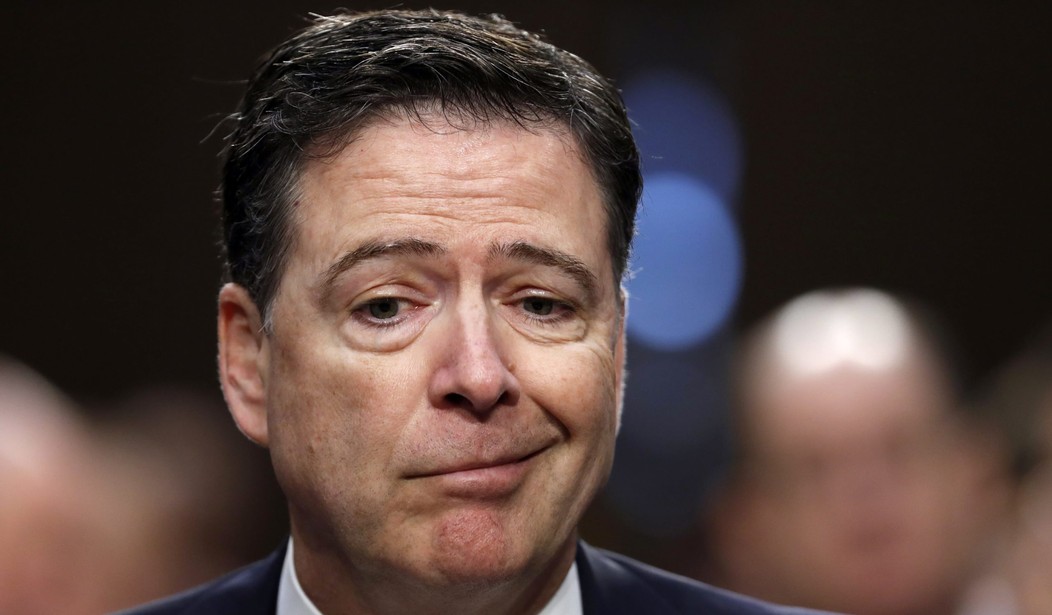Former FBI Director James Comey may have broken the law when he leaked one of his memos about President Trump to the media, a new report suggests.
Officials familiar with the documents told The Hill that more than half of the memos have been determined to contain classified information, raising the possibility that Comey broke some of the same rules Hillary Clinton broke when she mishandled classified information while secretary of State.
The former FBI director’s memos reportedly detail his recollections of conversations he had with President Trump about the Russia investigation.
Comey testified last month before the Senate Intelligence Committee that he considered the memos to be personal documents (an assertion that is hotly disputed) and that he shared at least one of them with a friend.
He asked that friend, a lawyer at Columbia University, to leak information from one memo to the news media in hopes of increasing pressure to get a special prosecutor named in the Russia case after Comey was fired as FBI director.
“So you didn’t consider your memo or your sense of that conversation to be a government document?” Sen. Roy Blunt (R-Mo.) asked Comey on June 8. “You considered it to be, somehow, your own personal document that you could share to the media as you wanted through a friend?”
“Correct,” Comey answered. “I understood this to be my recollection recorded of my conversation with the president. As a private citizen, I thought it important to get it out.”
Comey insisted in his testimony he believed his personal memos were unclassified, though he hinted one or two documents he created might have been contained classified information.
“I immediately prepared an unclassified memo of the conversation about Flynn and discussed the matter with FBI senior leadership,” he testified about the one memo he later leaked about former national security adviser Michael Flynn.
He added, “My view was that the content of those unclassified memorialization of those conversations was my recollection recorded.”
But when the seven memos Comey wrote regarding his nine conversations with Trump about Russia earlier this year were shown to Congress in recent days, the FBI claimed all were, in fact, deemed to be government documents.
While the Comey memos have been previously reported, this is the first time there has been a number connected to the amount of memos the ex-FBI chief wrote.
Four of the memos had markings making clear they contained information classified at the secret or confidential level, according to officials directly familiar with the matter.
A spokesman for the FBI on Sunday declined to comment.
FBI policy forbids any agent from releasing classified information or any information from ongoing investigations or sensitive operations without prior written permission, and it mandates that all records created during official duties are considered to be government property.
“Unauthorized disclosure, misuse, or negligent handling of information contained in the files, electronic or paper, of the FBI or which I may acquire as an employee of the FBI could impair national security, place human life in jeopardy, result in the denial of due process, prevent the FBI from effectively discharging its responsibilities, or violate federal law,” states the agreement all FBI agents sign.
Unable to restrain himself, President Trump immediately took to Twitter and shared his opinion that Comey’s leak was “so illegal!”
James Comey leaked CLASSIFIED INFORMATION to the media. That is so illegal!
— Donald J. Trump (@realDonaldTrump) July 10, 2017
But that remains to be seen, Professor Alan Dershowitz cautioned on Fox Business Monday morning.
“I think President Trump is making the same mistake that his critics make,” said Dershowitz. “A: He’s rushing to judgment about whether something is illegal. And second: he’s trying to criminalize political differences. He doesn’t like Comey…”
Dershowitz went on to note that Comey was wrong to say that the memos were his personal property.
“He’s wrong about that. They belong to Congress,” the Harvard Law professor said. “They reflect conversations that occurred while he was an employee of the United States of America. They are the property of the United States. What he did was at the very least unseemly.”
Dershowitz continued to rail against the former FBI director, but reiterated that it was too soon to say Comey definitely broke the law: “For a director of the FBI — whose job is to make sure there are no leaks of classified material — to himself use a Columbia law professor to launder material that may have contained classified information is unseemly. Whether it’s criminal or not — I think we need an investigation. We shouldn’t rush to call things criminal unless they are clearly criminal,” he said.
He added: “We are right in condemning him and holding him to the same standard he held Hillary Clinton to. We’re entitled to do that. What we’re not entitled to do is say, ‘it’s so illegal’ before we hear all the facts and all the evidence.”
Asked about the claims made in The Hill, Professor Daniel Richman, the Comey friend who leaked part of one memo to The New York Times, told Fox News that “this is a non-story.”
“No memos were given to the press, and no memos were classified at the time I received them,” Richman told Fox News, explaining that the “substance” of one memo was given to the press but not the physical document.
“That was not classified at the time, and remains unclassified,” he said.
Richman told Fox News he received four memos from Comey, all of which were not marked. Richman questioned the White House claims.
“It’s kind of interesting that the White House is now suggesting they’re true,” Richman said.
Special Counsel Robert Mueller’s office declined to comment on the ongoing investigation, when asked about the report in The Hill.
But whether or not the memos were marked classified is beside the point. As Dershowitz argued, they were government property and should have been cleared before they were shared.









Join the conversation as a VIP Member